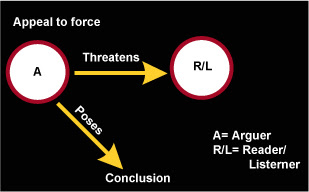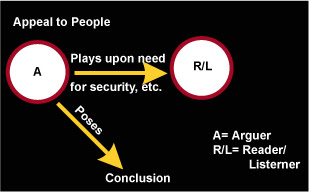1. Appeal to Force (Argumentum ad Baculum: Appeal to the "Stick")
This fallacy occurs when an arguer poses a conclusion to another person and tells that person either implicity or explicity that some harm will come to him or her if he or she does not accept the conclusion. Always involves a threat by the arguer to the physical or psychological well being of the listener. The threat opposed is logically irrelevant to the subject matter of the conclusion.
Example:
"Teletubies" is the best show on TV; and if you dont believe it, I am going to call my big brother over here and he is going to beat you up.

It occurs when an arguer attempts to support a conclusion by merely evoking pity from the reader or listener.
Example:
Your Honor, I admit that I declared 13 children as dependents on my tax return even though I have only two. But if you find me guilty of tax evasion, my reputation will be ruined. I'll probably loose my job, my poor wife will not be able to have the operation that she desperately needs, and my kids will starve. Surely I am not guilty.
The premises provided by the person is not relevant to the conclusion "Surely I am not guilty" even though it is psychologically relevant.
 3. Appeal to the People (Argumentun ad Populum)
3. Appeal to the People (Argumentun ad Populum)This fallacy uses desires to get the reader or listener to accept the conlcusion. There are 2 approaches involve, direct and indirect.
a. Mob Mentality (Direct approach): When an arguer addressing a large group of people, excites the emotions and enthusiam of the crowd.
b. Bandwagon (indirect approach): Plays the desire to fit in
Example: Of course you want to buy Zing toothpaste. Why, 90% of America brushes with Zing.
c. Vanity(indirect approach): often associates the product with someone who is admired, pursued, or imitated, the idea is that you, too will be admired and pursued if you use it.
Exampple: The Few, the Proud, the Marines.
d. Snobbery (indirect approach): It deals with the same association of vanity but it plays a desire to stand out:
Example: A Roll-Royce is not for everyone. If you qualify as one of the select few, this distinguished classic may be seen and driven at Bristish Motor Cars, Ltd.
 4. Argument against the person (Argumentum ad Hominem)
4. Argument against the person (Argumentum ad Hominem)
This involves 2 arguers. One of them advances (either directly or implicitly) a certain argument, and the other then responds by directing his or her attention not to the person's argument but the person himself. There are 3 types of ad Hominem.
a. Ad Hominem Abusive: the second person responds back the the first persons argument by verbal abuse
Example: Before he died, poet Allen Ginsberg argued in favor of legalizing pornography. But Ginsberg's arguments are nothign but trash. Ginsberg was a marijuana-smoking homosexual and thoughgoing advocate of the drug culture.
b. Ad Hominem Circumstantial: dismissing the arguments on the grounds that the arguer only makes it because of his circumstances or because he stands to benefit if its true.
Example: The Dalai Lama argues that China has no business in Tibet and that the West should do something about it. But the Dalai Lama just wants the Chinese to leave so he can return as leader. Naturally he argues this way. Therefore, we should reject his arguments.
c. Tu Quoque: dismissing or rejecting an argument on the grounds that the arguer is a hypocrite.
Example: Your argument that I should stop stealing candy from the candy store is no good. You tol me yourself just a week ago that you, too, stole candy when you were a kid.
 5. Accident
5. Accident
This fallacy is committed when a general rule is applied to a specific case i twas not intended to be; treating a general rule as if it was absolute.
Example:
Freedom of speech is constitutionally guaranteed right. Therefore, John Q. Radical should not be arrested for his speech that incited the riot last week.
 6. Straw Man
6. Straw Man
It is committed when an arguer distorts an opponents argument for the purpose of more easily attacking it. Twisting someones position or argument so tha tit sounds ridiculous.
Example:
Mr. Goldberg has argued against the prayer in public schools. Obviously he advocates atheism. But atheism is what they use to have Russia. Atheism leads to the suppression o fall regions and the replacement of God by an omnipotent state. Is that what we want for this country? I hardly think so. Clearly My. Goldberg's argument is nonsense.
 7. Missing the Point
7. Missing the PointThis fallacy iilustrates a special from of irrelevance. It occurs when the premises of a n argument support one particular conclusion, but then a diffrent conclusion, often vaguely related to the correct conclusion is drawn.
Example:
Abuse of the welfare system is rampant nowwdays. Our only altenative is to abolish the system altogether.
 8. Red Herring
8. Red Herring
This fallacy is committed when the arguer diverts the attention of the reader or listener bu changing the subject to a different but sometimes subltly related one.
Example:
There is a good deal of talk these days about pesticides from our fruits and vegetables. But many of these foods are essential to our health. Carrots are an excellent source of vitamin A, brocolli is rich in iron, and orange and grapefruits have lots of vitamin C.

No comments:
Post a Comment